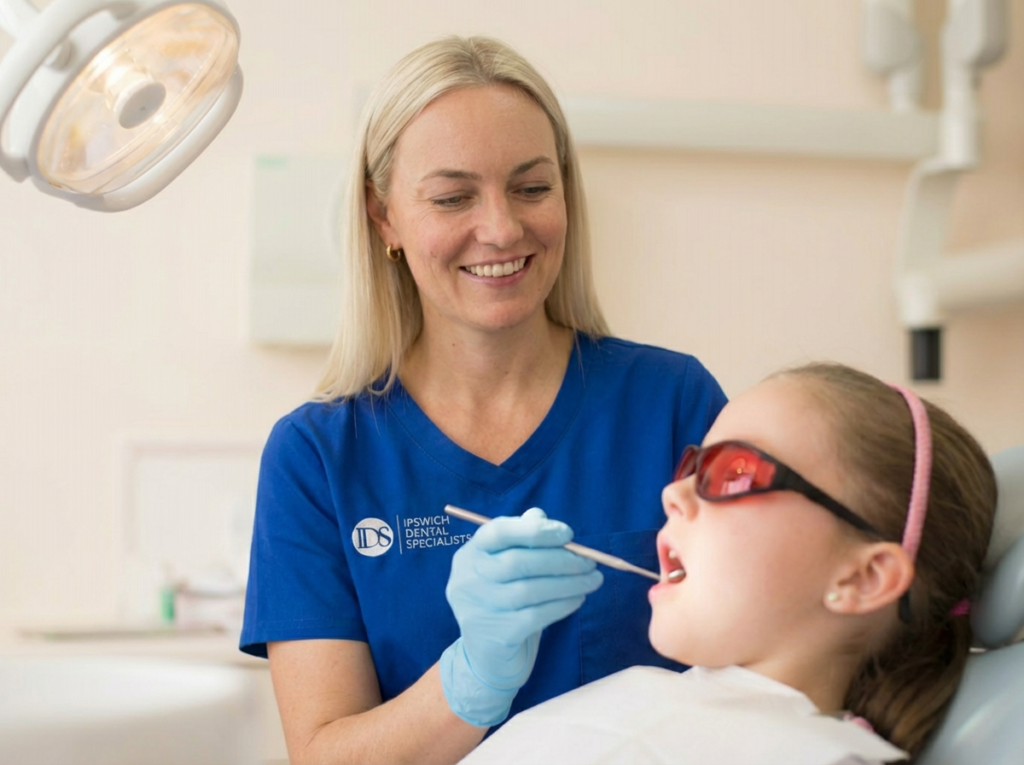Paediatric Dentistry
Book for Paediatric Dentistry Treatment

Paediatric Dentistry Caring for Your Child’s Smile
The Importance of Paediatric Dentistry
Managing Tooth Decay
Tooth Decay is one of the most common childhood dental issues. At IDS, we provide comprehensive management of tooth decay through:
Regular Check-Ups
Routine visits allow us to monitor your child’s oral health and catch decay early.
Fluoride Treatments
We offer fluoride applications to strengthen teeth and protect against cavities.
Dental Sealants
These protective coatings can be applied to the chewing surfaces of back teeth, significantly reducing the risk of decay.
Trauma and Injuries
Knocked-Out Teeth
If a tooth is knocked out, it’s crucial to act quickly. We provide guidance on how to preserve the tooth and assess whether it can be replanted.
Chipped or Fractured Teeth
We can repair damaged teeth using dental bonding or crowns, restoring function and appearance.
Soft Tissue Injuries
Injuries to the gums, lips, or cheeks may require assessment and treatment to ensure proper healing.
Sedation Options for Children
Nitrous Oxide (Laughing Gas)
A mild sedative that helps children relax while remaining awake and responsive.
Oral Sedation
For more extensive procedures, we may recommend oral sedation to provide a deeper level of relaxation.
Special Cases in Paediatric Dentistry
Why Choose IDS for Your Child’s Dental Care?
Friendly Environment
Our team is dedicated to creating a welcoming atmosphere, making dental visits enjoyable for children.
Expertise
Our paediatric dentists are specially trained to handle the unique needs of children, ensuring high-quality care.
Comprehensive Services
From preventive care to treatment for dental injuries, we offer a full range of paediatric dental services.
Client Results




Frequently Asked Questions About Paediatric Dentistry
We recommend bringing your child for their first dental visit by their first birthday or when their first tooth appears. Early visits help familiarise children with the dental environment and allow us to monitor their oral development.
Paediatric dentists specialise in treating children’s unique dental needs. They focus on preventive care, early intervention, and managing dental issues in a child-friendly way to ensure a positive experience and healthy habits for life.
Talk to your child about what to expect in a positive and encouraging way. Avoid using words like “pain” or “needle” and instead emphasise how the dentist helps keep their teeth healthy. Bringing a favourite toy or comfort item can also help them feel at ease.
Paediatric dentists offer preventive care like fluoride treatments and sealants, management of tooth decay, treatment for dental trauma, and advice on oral hygiene. They also address orthodontic concerns and provide specialised care for children with complex dental needs.
Our team is experienced in helping anxious children feel comfortable. We use a calm and gentle approach, explaining each step of the process in a way they can understand. We also offer inhalation sedation to help them relax during treatments.
Inhalation sedation, often called “happy gas,” involves a safe, odourless gas that helps children feel calm and relaxed. It is administered through a small mask, and its effects wear off quickly after the procedure, allowing children to return to their routine.
Private care offers a more personalised experience, shorter waiting times, and greater flexibility in scheduling. Additionally, private practices like ours provide a child-friendly environment designed to make visits as comfortable and stress-free as possible.
If your child experiences a dental injury, contact us immediately. Time-sensitive care is often crucial in managing trauma effectively. Keep any displaced tooth moist (preferably in milk) and avoid handling it by the root.
Yes, baby teeth play a crucial role in a child’s development. They help with chewing, speech development, and maintaining space for permanent teeth. Keeping them healthy prevents pain, infections, and potential complications.
Booking is simple—just give us a call or use our online booking system. If your child feels nervous, let us know, and we’ll ensure their visit is as relaxed and supportive as possible.

